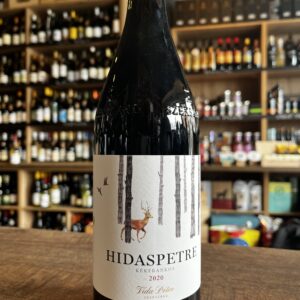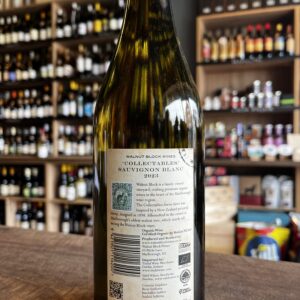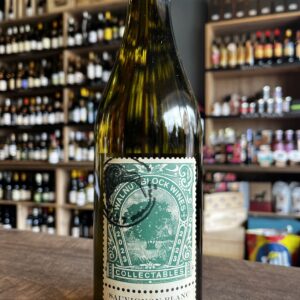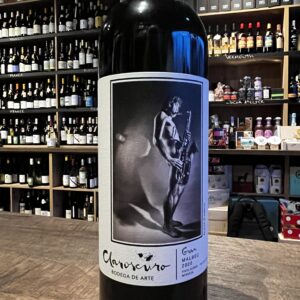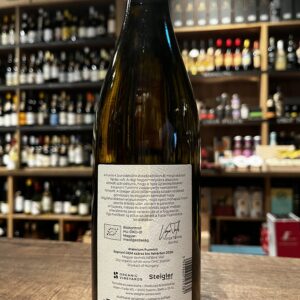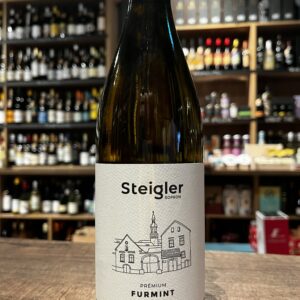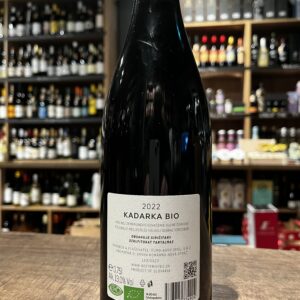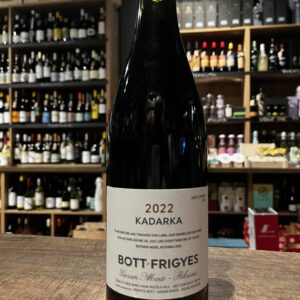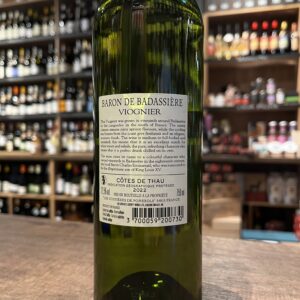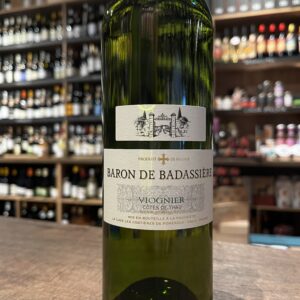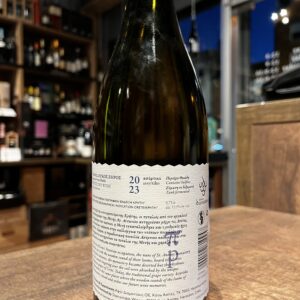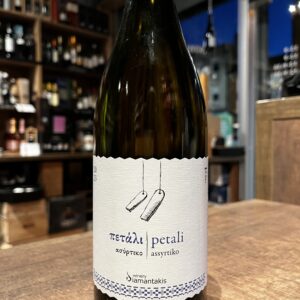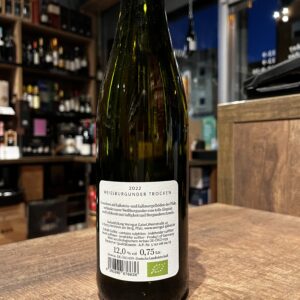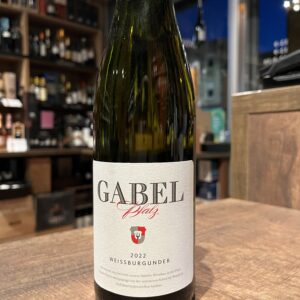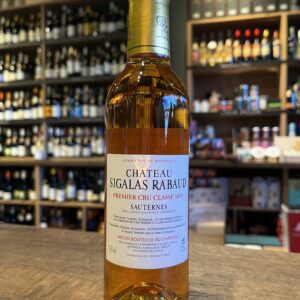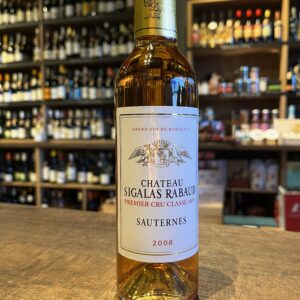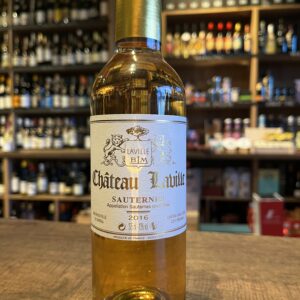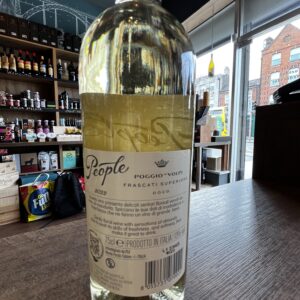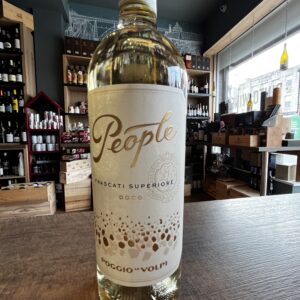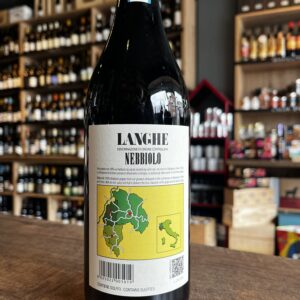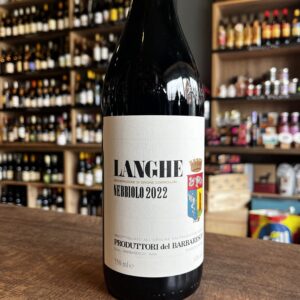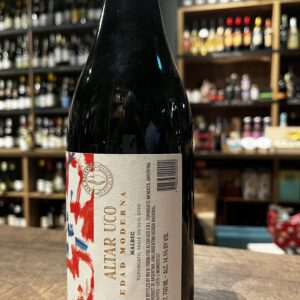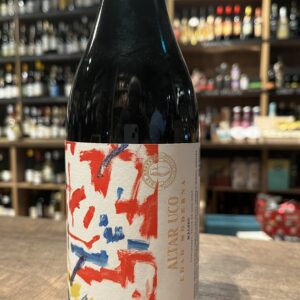-
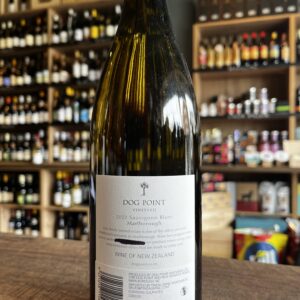
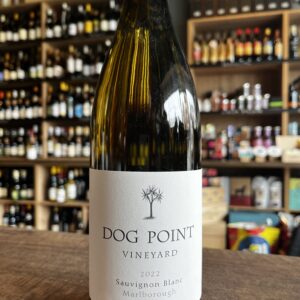 Dog Point Vineyard is New Zealand's largest certified organic vineyard by Biogro NZ. We are family owned and one of the oldest privately established vineyards, located on the hill slopes of the Southern Valleys of Marlborough, New Zealand. Marlborough is blessed with one of the sunniest and driest climates in New Zealand. The significant diurnal temperature range between cool nights and sunny days allows ideal conditions for the long slow ripening of grapes. Soils are crucial to the character of our wine. Most soils have been laid down within the last 14,000 years carved and eroded by glaciers in the high country and carried down to the coast by melt-water rivers. Older well-established vines are situated on free draining silty clay loams. This is supplemented with more recent plantings on closely planted hillside blocks on soils with a clay loam influence. Pair with fresh, simple seafood dishes especially oysters. Also compliments goat's cheese well
Dog Point Vineyard is New Zealand's largest certified organic vineyard by Biogro NZ. We are family owned and one of the oldest privately established vineyards, located on the hill slopes of the Southern Valleys of Marlborough, New Zealand. Marlborough is blessed with one of the sunniest and driest climates in New Zealand. The significant diurnal temperature range between cool nights and sunny days allows ideal conditions for the long slow ripening of grapes. Soils are crucial to the character of our wine. Most soils have been laid down within the last 14,000 years carved and eroded by glaciers in the high country and carried down to the coast by melt-water rivers. Older well-established vines are situated on free draining silty clay loams. This is supplemented with more recent plantings on closely planted hillside blocks on soils with a clay loam influence. Pair with fresh, simple seafood dishes especially oysters. Also compliments goat's cheese well -
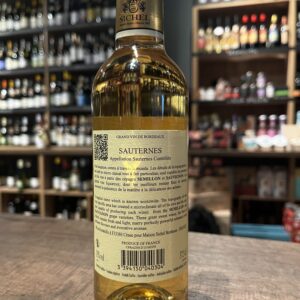
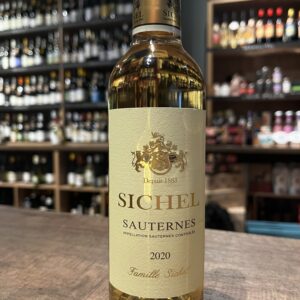 This is a declassified wine from a top Chateau in Sauternes...shhh, they dont want you to know their name! or...just keep reading Maison Sichel is a Bordeaux based, family owned and run negociant of six generations. The Sichel family have been a sugnificant prescence in Bordeaux since 1883 and have continued to expand operations by purchasing several properties in Bordeaux including Chateau Angludet and Chateau Argaden. The Sichel family also joined with three other family in 1938 to purchase the now legendary Chateau Palmer. Maison Sichel continued to expand their operations outside of Bordeaux with Chateau Trillol in Corbieres and have several high quality own label wines such as the Sichel Sauternes and the Sichel Margaux. The Sichekl Vineyards are situated some 40 kilometers south east of Bordeaux, between the Garonne river and the Landes forest to the south. A blend of 80% Semillon, 15% Sauvignon Blanc and 5% Muscadelle from 50 year old vines where Botrytis is encouraged to dehydrate the grapes. This Sauterne has been aged for 10 to 12 months.
This is a declassified wine from a top Chateau in Sauternes...shhh, they dont want you to know their name! or...just keep reading Maison Sichel is a Bordeaux based, family owned and run negociant of six generations. The Sichel family have been a sugnificant prescence in Bordeaux since 1883 and have continued to expand operations by purchasing several properties in Bordeaux including Chateau Angludet and Chateau Argaden. The Sichel family also joined with three other family in 1938 to purchase the now legendary Chateau Palmer. Maison Sichel continued to expand their operations outside of Bordeaux with Chateau Trillol in Corbieres and have several high quality own label wines such as the Sichel Sauternes and the Sichel Margaux. The Sichekl Vineyards are situated some 40 kilometers south east of Bordeaux, between the Garonne river and the Landes forest to the south. A blend of 80% Semillon, 15% Sauvignon Blanc and 5% Muscadelle from 50 year old vines where Botrytis is encouraged to dehydrate the grapes. This Sauterne has been aged for 10 to 12 months. -
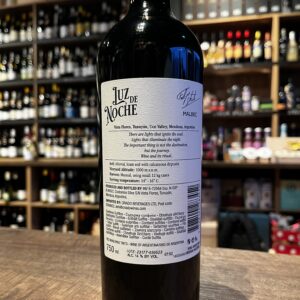
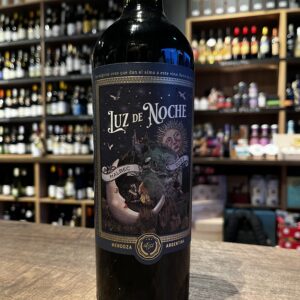 The revered Argentinian musician-Filipe Staiti- and owner of this beautiful winery situated in the Iconic wine region Tupungato-Mendoza told me to add the following to wine page: There are lights that ignite the soul. Lights that illuminate the night. The important thing is not the destination, but the journey. Wine and its ritual... Sounds better in Spanish, trust me! As for the wine In case you didn't know Luz de Noche translates to english as “Light of the Night”. In fact, harvest takes place during the night in the month of March, hence really the name of wine. Ideal for pasta with tomato or Bolognese sauce, pizza and meats
The revered Argentinian musician-Filipe Staiti- and owner of this beautiful winery situated in the Iconic wine region Tupungato-Mendoza told me to add the following to wine page: There are lights that ignite the soul. Lights that illuminate the night. The important thing is not the destination, but the journey. Wine and its ritual... Sounds better in Spanish, trust me! As for the wine In case you didn't know Luz de Noche translates to english as “Light of the Night”. In fact, harvest takes place during the night in the month of March, hence really the name of wine. Ideal for pasta with tomato or Bolognese sauce, pizza and meats -
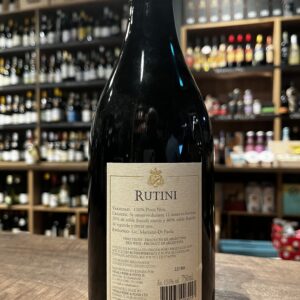
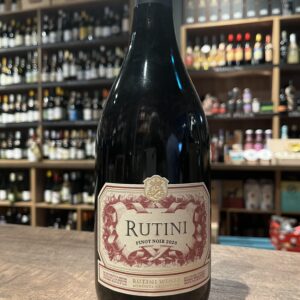 From the start, Felipe Rutini was guided by the motto “Labor and perseverance.” This attitude shaped the development of his wines, which became synonymous with superlative quality. Following his innovative spirit, in 1925 the winery began to plant vines in the Uco Valley. Uco Valley vineyards comprise over 400 hectares at an altitude of between 1,050 and 1,200 meters above sea level. An additional 120 hectares of fields that are currently being planted with vines will expand the winery’s possibilities for producing unique wines that are carefully tended to and nurtured from the very beginning. Very promising wines that need that leap of faith due to price. I suppose Mariano Di Paola being within the best 30 best winemakers in the world may have something to do with it... We do recomend it, just not everyday!
From the start, Felipe Rutini was guided by the motto “Labor and perseverance.” This attitude shaped the development of his wines, which became synonymous with superlative quality. Following his innovative spirit, in 1925 the winery began to plant vines in the Uco Valley. Uco Valley vineyards comprise over 400 hectares at an altitude of between 1,050 and 1,200 meters above sea level. An additional 120 hectares of fields that are currently being planted with vines will expand the winery’s possibilities for producing unique wines that are carefully tended to and nurtured from the very beginning. Very promising wines that need that leap of faith due to price. I suppose Mariano Di Paola being within the best 30 best winemakers in the world may have something to do with it... We do recomend it, just not everyday! -
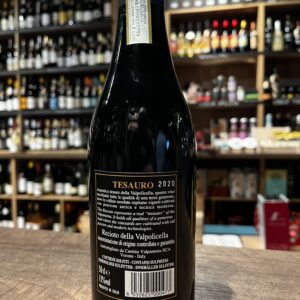
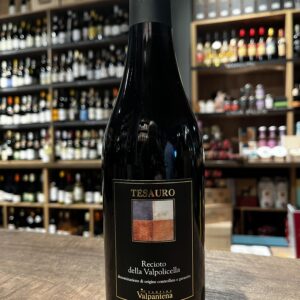 The Torre del Falasco wines are the standard bearers of this co-operative, situated in the Valpantena, northeast of Verona. Known as the ’valley of god’ to the ancient Greeks, this area is well-known for its high quality red wines, due partly to the soils but also because of the cool breeze that blows down the valley from the foothills of the Dolomites. Cantina Valpantena Tesauro Recioto della Valpolicella is the perfect dessert wine and pairs well with chocolate, cheese, and other sweet treats. With its unique blend of grapes and traditional winemaking techniques, this wine is sure to impress even the most discerning of wine lovers.
The Torre del Falasco wines are the standard bearers of this co-operative, situated in the Valpantena, northeast of Verona. Known as the ’valley of god’ to the ancient Greeks, this area is well-known for its high quality red wines, due partly to the soils but also because of the cool breeze that blows down the valley from the foothills of the Dolomites. Cantina Valpantena Tesauro Recioto della Valpolicella is the perfect dessert wine and pairs well with chocolate, cheese, and other sweet treats. With its unique blend of grapes and traditional winemaking techniques, this wine is sure to impress even the most discerning of wine lovers. -
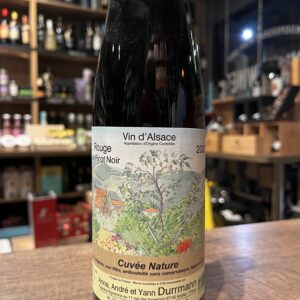 This wine is imported exclusively for Pinto Wines. The Durrmann estate is located in the municipality of Andlau, in Alsace, an ancient medieval village in which vines have been cultivated for more than a thousand years. The winery was created in 1979 with some vineyards owned by Yann's grandfather, who was a shoemaker. The lack of experience in the wine sector was a disadvantage as they had to start from scratch, but also a big advantage as they were able to immediately differentiate themselves from tradition and move towards the most natural agriculture possible with a push "of thought "very innovative. As André expanded the domain into what it is today and managed to collect a beautiful vineyard property (more than 8 hectares now), he been working completely organically since 1998, but he also applies permaculture principles to achieve the greatest possible biodiversity in the vineyards. For example, he planted trees among the grapes. He does not plow the vineyards, because he thinks that would disrupt soil life. At most he mows the grass. In winter he lets his own small flock of sheep graze the vineyards. To keep it within the vineyard, he has fenced off all his plots with mesh and fences; This also helps to keep wild boars - which appear to have a great preference for organic vineyards! - at bay. André cruises through the village in an electric car, powered by electricity he produces himself (because he refuses to use electricity from a nuclear power plant). His wife Anna cooks vegetables and potatoes on two large dishes in the courtyard that catch the sunlight and heat the pans. Anyway, you get the picture. Son Yann has now taken over the domain and more and more cuvées are now made completely naturally. Not filtered, and without added sulfite. They also still make some cuvées with sulphite, because they do not want to alienate the large private customer base that buys at the door. But most customers respond positively, so they will steadily expand the nature range. Even Rieslings from Grand Cru vineyards are now being marketed as natural wine. Taste this next to the sulfited version and you will notice that the terroir in the natural version comes out even better! Perfect at room temperature in the winter, slightly chill it in the summer. Serve with white meat or light nibbles or on its own!!Delicious and to come back for more
This wine is imported exclusively for Pinto Wines. The Durrmann estate is located in the municipality of Andlau, in Alsace, an ancient medieval village in which vines have been cultivated for more than a thousand years. The winery was created in 1979 with some vineyards owned by Yann's grandfather, who was a shoemaker. The lack of experience in the wine sector was a disadvantage as they had to start from scratch, but also a big advantage as they were able to immediately differentiate themselves from tradition and move towards the most natural agriculture possible with a push "of thought "very innovative. As André expanded the domain into what it is today and managed to collect a beautiful vineyard property (more than 8 hectares now), he been working completely organically since 1998, but he also applies permaculture principles to achieve the greatest possible biodiversity in the vineyards. For example, he planted trees among the grapes. He does not plow the vineyards, because he thinks that would disrupt soil life. At most he mows the grass. In winter he lets his own small flock of sheep graze the vineyards. To keep it within the vineyard, he has fenced off all his plots with mesh and fences; This also helps to keep wild boars - which appear to have a great preference for organic vineyards! - at bay. André cruises through the village in an electric car, powered by electricity he produces himself (because he refuses to use electricity from a nuclear power plant). His wife Anna cooks vegetables and potatoes on two large dishes in the courtyard that catch the sunlight and heat the pans. Anyway, you get the picture. Son Yann has now taken over the domain and more and more cuvées are now made completely naturally. Not filtered, and without added sulfite. They also still make some cuvées with sulphite, because they do not want to alienate the large private customer base that buys at the door. But most customers respond positively, so they will steadily expand the nature range. Even Rieslings from Grand Cru vineyards are now being marketed as natural wine. Taste this next to the sulfited version and you will notice that the terroir in the natural version comes out even better! Perfect at room temperature in the winter, slightly chill it in the summer. Serve with white meat or light nibbles or on its own!!Delicious and to come back for more -
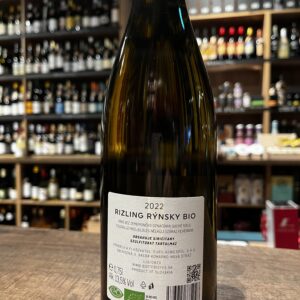
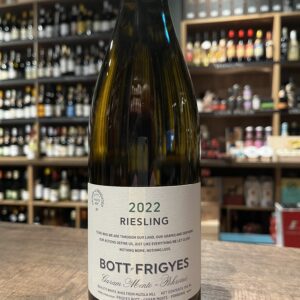 A beautifully clean biodynamic Riesling that will shock most enthusiasts and wine experts alike. Charming honied peaches on the nose, yet a superbly elegant and dry palate of great intensity and length. Spontaneous fermentation and 9 months on the lees in Stockinger barrels add complexity, while the great reductive strength comes from the volcanic terroir. Bott Frigyes is a tiny family producer in Southern Slovakia, who takes the Burgundian approach and quality to winemaking with a Central European twist. Pair it with Iberico pork chops grilled on the bone, finished in thyme infused butter. Sensational.
A beautifully clean biodynamic Riesling that will shock most enthusiasts and wine experts alike. Charming honied peaches on the nose, yet a superbly elegant and dry palate of great intensity and length. Spontaneous fermentation and 9 months on the lees in Stockinger barrels add complexity, while the great reductive strength comes from the volcanic terroir. Bott Frigyes is a tiny family producer in Southern Slovakia, who takes the Burgundian approach and quality to winemaking with a Central European twist. Pair it with Iberico pork chops grilled on the bone, finished in thyme infused butter. Sensational. -
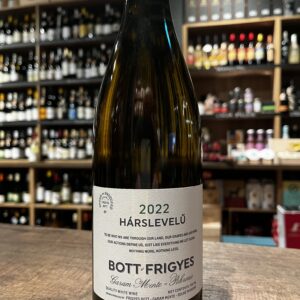 Hárslevelű is one of the most unique grape varieties in Central Europe - a relative of the Hungarian Furmint. It has aromas of linden blossom with honied chestnut, pear and apricot. Dry palate, balanced acidity with a silky texture, medium body. Spontaneous fermentation and 9 months on the lees in Stockinger barrels add complexity, while the great reductive strength comes from the volcanic terroir. Bott Frigyes is a tiny family producer in Southern Slovakia, who takes the Burgundian approach and quality to winemaking with a Central European twist. Single-vineyard Hárslevelű develops well in bottle, so you can also lay them down for a year or two. Very enjoyable on its own, however due to its rich flavours and a delicate volcanic minerality, you can go complex with food pairings. John Dory, turbot or even veal are good choices with high-quality Hárslevelű. Extremely limited. Maximum 1 bottle per order.
Hárslevelű is one of the most unique grape varieties in Central Europe - a relative of the Hungarian Furmint. It has aromas of linden blossom with honied chestnut, pear and apricot. Dry palate, balanced acidity with a silky texture, medium body. Spontaneous fermentation and 9 months on the lees in Stockinger barrels add complexity, while the great reductive strength comes from the volcanic terroir. Bott Frigyes is a tiny family producer in Southern Slovakia, who takes the Burgundian approach and quality to winemaking with a Central European twist. Single-vineyard Hárslevelű develops well in bottle, so you can also lay them down for a year or two. Very enjoyable on its own, however due to its rich flavours and a delicate volcanic minerality, you can go complex with food pairings. John Dory, turbot or even veal are good choices with high-quality Hárslevelű. Extremely limited. Maximum 1 bottle per order. -
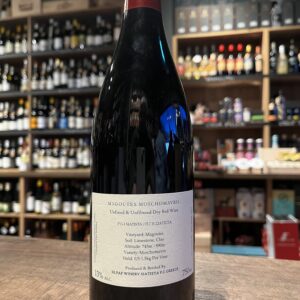
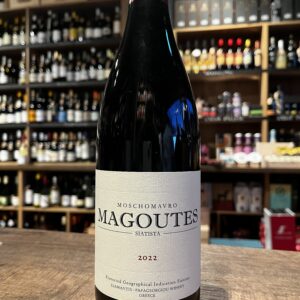 Magoutes winery, run by Dimitris Diamantis, is located in the old but forgotten region of Siatista in the mountains of northern Greece. Here vineyards have been abandoned and then revived centuries ago. The city of Siatista is nestled on the slopes of Mount Siniatsiko. The soils of the vineyards are limestone-based which adds elegance and acidity to this ruby-hued red wine. Moshomavro means 'black muscat' but is no relation in parentage or flavour! Lovers of of Beaujolais or Italian reds like pelaverga, rossesse or schiava will find a lot to appreciate in moschómavro, a variety historically interplanted with xinómavro and others in the western Macedonian mountains. Make sure to open this well in advance to get the full show, as a couple of hours of air will bring out its best qualities. It’s the ideal wine to pair with a cheese and meat board or fish. It’s also lovely with a slight chill on a warm day.
Magoutes winery, run by Dimitris Diamantis, is located in the old but forgotten region of Siatista in the mountains of northern Greece. Here vineyards have been abandoned and then revived centuries ago. The city of Siatista is nestled on the slopes of Mount Siniatsiko. The soils of the vineyards are limestone-based which adds elegance and acidity to this ruby-hued red wine. Moshomavro means 'black muscat' but is no relation in parentage or flavour! Lovers of of Beaujolais or Italian reds like pelaverga, rossesse or schiava will find a lot to appreciate in moschómavro, a variety historically interplanted with xinómavro and others in the western Macedonian mountains. Make sure to open this well in advance to get the full show, as a couple of hours of air will bring out its best qualities. It’s the ideal wine to pair with a cheese and meat board or fish. It’s also lovely with a slight chill on a warm day. -
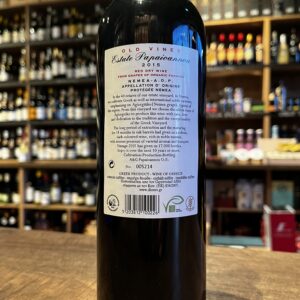
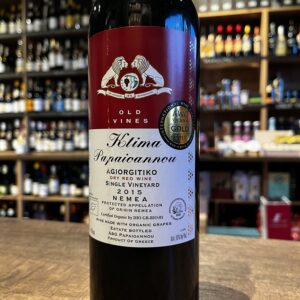 Thanasis Papaioannou was regarded as one of the most important figures of modern Greek winemaking. His belief is a combination of indigenous varieties and organic viticulture are the vital ingredients to produce balanced wines reflecting the terroir. Today, his son works with 57 hectares of organically certified vineyards, located in the Nemea region of the Peloponnese. The wines demonstrating real character at exceptional prices. Nemea is arguably Greece's most important red-wine region, located in the northeastern corner of the Peloponnese peninsula. The village of Nemea is around 20 miles (35km) southwest of Corinth, and the appellation that surrounds the village is geographically the largest in Greece. Around 40 wineries are located there and the area has seen a huge amount of investment and growth over the past few decades. The surrounding mountains and valleys have been producing wine for centuries. Agiorgitiko is an ancient Greek grape variety mostly planted in Nemea, named for the small St George's Church found within the boundaries of the appellation: Agiorgitiko translates as "St George's grape“. A wide range of styles are made from this red grape variety, from lighter, fruitier wines to rich, age-worthy examples such as this. The label references the ‘Lion of Nemea’; a creature of Greek legend, killed by Heracles. Their Old Vines cuvée is made from the estate's oldest Agiorgitiko vines. This dish with duck breast, Brussels sprouts with bacon and Polenta is a perfect partner for the Old Vines from Papaioannou, where the black cherry note is an ideal combination.
Thanasis Papaioannou was regarded as one of the most important figures of modern Greek winemaking. His belief is a combination of indigenous varieties and organic viticulture are the vital ingredients to produce balanced wines reflecting the terroir. Today, his son works with 57 hectares of organically certified vineyards, located in the Nemea region of the Peloponnese. The wines demonstrating real character at exceptional prices. Nemea is arguably Greece's most important red-wine region, located in the northeastern corner of the Peloponnese peninsula. The village of Nemea is around 20 miles (35km) southwest of Corinth, and the appellation that surrounds the village is geographically the largest in Greece. Around 40 wineries are located there and the area has seen a huge amount of investment and growth over the past few decades. The surrounding mountains and valleys have been producing wine for centuries. Agiorgitiko is an ancient Greek grape variety mostly planted in Nemea, named for the small St George's Church found within the boundaries of the appellation: Agiorgitiko translates as "St George's grape“. A wide range of styles are made from this red grape variety, from lighter, fruitier wines to rich, age-worthy examples such as this. The label references the ‘Lion of Nemea’; a creature of Greek legend, killed by Heracles. Their Old Vines cuvée is made from the estate's oldest Agiorgitiko vines. This dish with duck breast, Brussels sprouts with bacon and Polenta is a perfect partner for the Old Vines from Papaioannou, where the black cherry note is an ideal combination. -
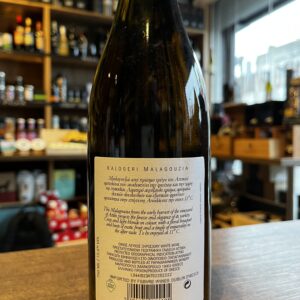
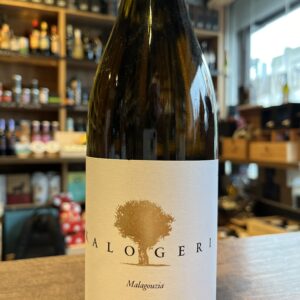 Domaine Papagiannakos was established in 1919 in the heart of the plain of Mesogaia, Attica - just 30km from the shadow of the Acropolis. Third generation winemaker, Vassilis Papagiannakos, was born and bred in Markopoulo, and grew up around the family winery. At that time the Savatiano variety was the winery' s sole focus - but later Malagouzia was introduced, along with Cabernet Sauvignon, Merlot and other varieties. Vassilis owns 10 hectares of vineyard in the Attica region, and maintains long-term leases on a further 20 hectares, with vines on average 50-60 years old. Rocky, sandy, clay topsoil nurtures low yielding bush vines - extremely limited irrigation is employed. The Papagiannakos family continues its traditions whilst bringing the winery into the 21st Century with a stunning and innovative bioclimatic winery. Pair it with Fish Fried, Poultry Casseroles White, Risotto
Domaine Papagiannakos was established in 1919 in the heart of the plain of Mesogaia, Attica - just 30km from the shadow of the Acropolis. Third generation winemaker, Vassilis Papagiannakos, was born and bred in Markopoulo, and grew up around the family winery. At that time the Savatiano variety was the winery' s sole focus - but later Malagouzia was introduced, along with Cabernet Sauvignon, Merlot and other varieties. Vassilis owns 10 hectares of vineyard in the Attica region, and maintains long-term leases on a further 20 hectares, with vines on average 50-60 years old. Rocky, sandy, clay topsoil nurtures low yielding bush vines - extremely limited irrigation is employed. The Papagiannakos family continues its traditions whilst bringing the winery into the 21st Century with a stunning and innovative bioclimatic winery. Pair it with Fish Fried, Poultry Casseroles White, Risotto


